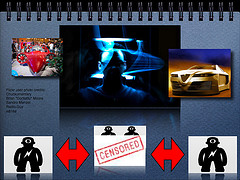Notes from my "Law That Works" talk at VON '07

I was one of several folks who spoke today on policy issues at Video on the Net. Since my talk riffs on Jeff Jarvis's, which I blogged earlier, and since I actually have notes for a change, here they are. And here's a Flickr set of the accompanying slides.
Jeff Jarvis told us Tuesday that we're reinventing TV, and this time it's ours.
On the legal front, we're caught in a tempest of alternately dreading regulatory attention and inviting it ('Net neutrality; Pulver's hands-off-video petition; Skype's cellular Carterfone), DMCA ping-pong, fair use flip-flopping, and polarizing coypright wars.
Though this can all seem a bit dark and depressing, what it really means is a subpoint to Jeff's: we get to reinvent not just TV but its law. And this time it's ours.
Along those lines, Jonathan Askin has nominated himself for the post of Chief Justice of Second Life.
How and why to we get to reinvent the law? Because in the lack of a framework built to support these activities, sistas (and brothas) are doin' it for themselves. And can and should keep doing it, and do even more. As means and mores for interacting with one another, and with one another's creative works, are established, these measures act to fill the gaps. And when courts and regulators see an economically and socially healthy ecosystem arise from these gapfillers, there will be scant legitimate motive (special interest money and lobbying efforts notwithstanding) to undo them. Hence, we get to do the law the way it should be done, the way that works best for this arena. But accomplishing this (or accomplishing it with sufficient speed) requires recognizing what's at stake and what needs to be done. It won't happen by continuing to try to bolt Video-on-the-Net legal considerations onto laws and processes trapped in a music- and movie-on-disk time warp.
If you're a regular person, when you think about the future you probably imagine a Minority Report world of flying cars and virtual displays. If you're a certain odd species of lawyer, you might imagine contracts that are both flying and virtual. Contracts formed not by mailing or faxing pieces of paper and blue or black (but not red) ink signatures back and forth. Contracts formed by the relevant personal agents and bots having sex with our preestablished permissions and parameters data. Sex is a good metaphor. Jeff Jarvis discussed how metrics are sex for advertisers. Doc Searls says federated identity is a series of vendors having sex with our data.
It's not made explicit frequently enough, but one of the core purposes of Creative Commons is to let agents and bots have sex with our permissions data. That's why the licenses are machine readable. That's why they can be embedded as metadata in digital files. Accordingly, we see the early progenitors of flying contracts today.
On the creator side, Creative Commons lets you express usage conditions in a machine readable way. On the user side, Creative Commons search, such as that in Flickr, lets you locate works that fit your requirements, both substantitively and from a permissions standpoint. (Example: let me see all the pictures of candy, or all the bass blues riffs, that are licensed for commercial use in exchange for attribution.)
A few interesting facts about Creative Commons:
- Though it's impossible to know precisely how many works carry creative commons licenses, it's at least in the tens of millions, based on the Flickr Creative Commons search index alone.
- Despite the existence of at least tens of millions of Creative Commons licensed works, in the almost 5 years Creative Commons has existed its licenses have come under judicial scrutiny only a handful of times, and in each instance have been found valid and enforceable.
- Almost as many Flickr using Creative Commons licensors want to propogate use of Creative Commons licenses through use of the "Share Alike" condition as those who are interested in controlling their works through use of the "No Derivatives" condition.
The realities of Internet video, and 'Net distributed creativity in general, require turning Cole Porter on his head and giving parties new, more practical, streamlined ways to say "Let's Behave!" Here are some more examples.
- Code is law, Creative Commons. We've discussed.
- Lisensa: blogs only for the time being, but the Creative Commons on steroids approach, with creator dictated payments enabled, is the point. (I'm on the advisory board.)
- Brightcove (from the FAQ):
Licensing Services – Dreaming big and looking for content? Our Licensing Services help you acquire the perfect video content for your site or device. Soon, you'll be able to browse the Brightcove Syndication Marketplace for content that you can buy on a performance basis. Just pay for what you use.
- YouTube: New role front and center role for Terms of Service; no longer just
something to ignore, now a living, breathing, dynamic relationship
building machine. Revver, Metacafe, Videoegg, etc. Different approaches with a common theme that perhaps should be the official slogan of reinvented TV: "License it, benefit." (In money, attention, or both.) - Microformats: one means of addressing the problem of RSS and implied license uncertainties. (See Myheavy.com fiasco.) Also key to provisioning the new law's infrastructure (Creative Commons search as with Flickr; "flying contract" transactions)
- Putting clickthroughs to work. (WordPress plugin for podcast releases.)
- More automating of the automatable: Chilling Effects' DMCA
counterdesignation tool; Wendy Seltzer saga's latest. - And stabilizing the unstable: CIS documentary film fair use project. (Take it
a step further, envision a TRUSTe for fair use, based on compliance
with approved best practices.) - Planting and harvesting from outside unlicensed walled gardens:
Magnatune, CC Mixter, Pump Audio, Podsafe Music Network. - Everyone's rights matter, not just the big boys': Attention Trust (I'm on the board), Project VRM
In his science fiction novel Eastern Standard Tribe, Cory Doctorow wrote about a not-too-distant future where network-enabled legal dealings flow smoothly, unobtrusively, and correctly. (Actually, the book is filled with far more dramatic and interesting things, but I've never quite been able to get past this subtext.)
The reinvented law of reinvented TV is built — route-around by route-around — on the damage of things like byzantine music licensing rules, nonexistent Hollywood film licensing alternatives, antiquated procedural niceties, and the inability of our undeniably glorious (when compared with other alternatives) legal system to deliver certainty on a host of business-critical and livelihood-critical issues.
You, all of us, can help build the new law by focusing our energies on these tools and building or demanding more of them. Before long they'll draw in the denizens of the old law — witness the flurry of licensing deals struck with the iTunes and YouTubes of the world. As this happens, the new law becomes mainstream and ultimately formally endorsed by our legal institutions. This reinvented law doesn't throw out the old one. That's not what Jeff Pulver means when he says sometimes it's better to ask for forgiveness than permission. What he means is the more we streamline these relationships, the more we build law that works.
[tag: von07]
